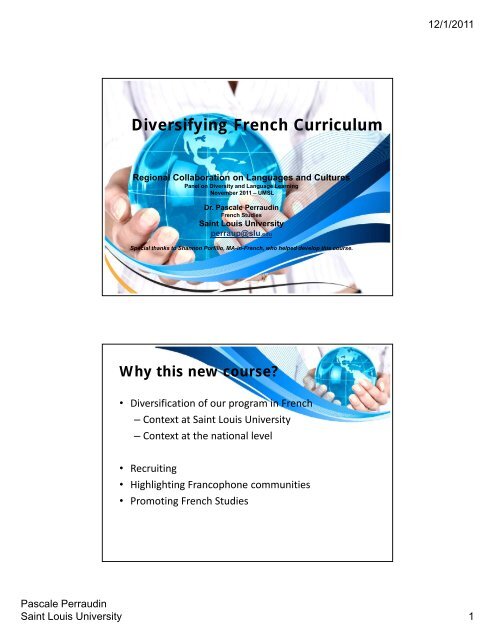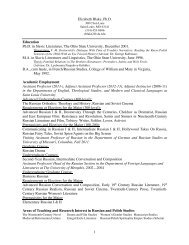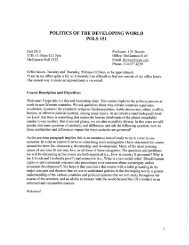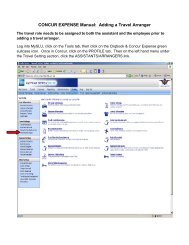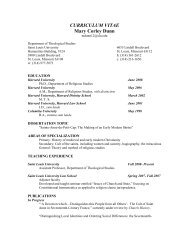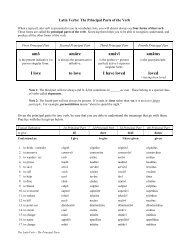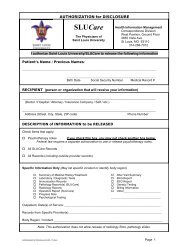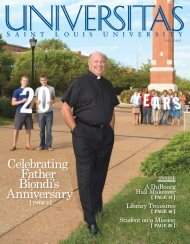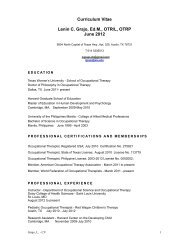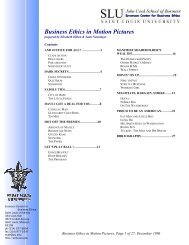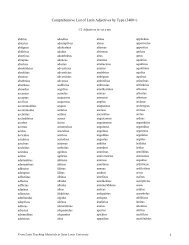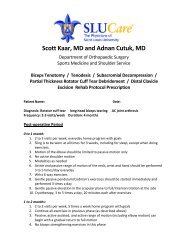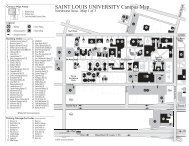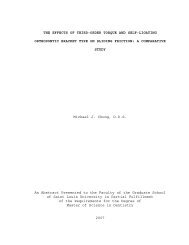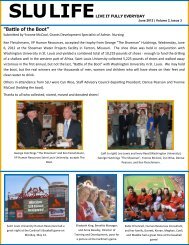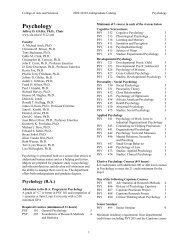Diversifying French Curriculum - Saint Louis University
Diversifying French Curriculum - Saint Louis University
Diversifying French Curriculum - Saint Louis University
You also want an ePaper? Increase the reach of your titles
YUMPU automatically turns print PDFs into web optimized ePapers that Google loves.
<strong>Diversifying</strong> <strong>French</strong> <strong>Curriculum</strong><br />
Regional Collaboration on Languages and Cultures<br />
Panel on Diversity and Language Learning<br />
November 2011 – UMSL<br />
Dr. Pascale Perraudin<br />
<strong>French</strong> Studies<br />
<strong>Saint</strong> <strong>Louis</strong> <strong>University</strong><br />
perraup@slu.edu<br />
Special thanks to Shannon Porfilio, MA-in-<strong>French</strong>, who helped develop this course.<br />
Why this new course?<br />
• Diversification of our program in <strong>French</strong><br />
– CContext t tat t SitL <strong>Saint</strong> <strong>Louis</strong> i U<strong>University</strong> i it<br />
– Context at the national level<br />
• Recruiting<br />
• Highlighting g g gFrancophone p communities<br />
• Promoting <strong>French</strong> Studies<br />
12/1/2011<br />
Pascale Perraudin<br />
<strong>Saint</strong> <strong>Louis</strong> <strong>University</strong> 1
<strong>French</strong> with Specific Goals<br />
(Français sur objectif spécifique-FOS)<br />
• Usually for students with specific professional goals<br />
• Students in this course:<br />
• Majors and non‐majors in political science and<br />
international relations<br />
• Competency level: intermediate high (B2) to<br />
advanced (C1)<br />
Our objectives (FOS)<br />
• Develop knowledge of Francophone communities and<br />
• Develop knowledge of Francophone communities and<br />
institutions<br />
• Support interdisciplinarity<br />
• Develop professional and intercultural skills<br />
• Acquire linguistic competencies<br />
12/1/2011<br />
Pascale Perraudin<br />
<strong>Saint</strong> <strong>Louis</strong> <strong>University</strong> 2
Developing such a course…<br />
Advantages<br />
• Opportunity to create a<br />
course tailored to students’<br />
needs<br />
• Diversification of the<br />
curriculum<br />
• Pragmatic opening towards<br />
the Francophone world<br />
Resources/References<br />
Challenges<br />
• Vast field of study<br />
• No textbooks<br />
• Disparity in students’<br />
training<br />
• Outside of our immediate<br />
specialization<br />
International Relations:<br />
• Bassi, Claude et Anne‐Marie Chapsal. Diplomatie.com. CLE International,<br />
2005. ISBN: 209‐033184‐4<br />
• Beauchesne Beauchesne, Bénédicte Bénédicte. Relations internationales internationales. Collection Actu<br />
concours. Paris: Ellipses, 2008. ISBN: 978‐2‐7298‐387‐7<br />
• Danny, Max, Noëlle Clément‐Rondepierre, <strong>Louis</strong> Dollet, Claude Poulet. Le<br />
français des relations internationales. Hachette, 1983. (isbn: 2‐01‐<br />
008473x) Série le français et la profession<br />
• Gounelle, Max. Relations internationales. Collection “Mémentos” Dallos.<br />
Paris: Dallos, 2008. ISBN: 978‐2‐247‐08016‐8<br />
• MMoreau‐Desfarges, D f Phili Philippe. Rlti Relations IInternationales. t ti l QQuestions ti<br />
mondiales 2. Paris: Seuil, 2004.<br />
• Pérès, Rémi. Thèmes d’actualités économiques, politiques et sociaux. 2009‐<br />
2010. Paris: Magnard‐Vuibert, 2009. ISBN: 978‐2‐7117‐1266‐3<br />
• Riehl, Laurence, Michel Soignet, Marie‐Hélène Amiot. Objectif diplomatie :<br />
le français des relations européennes et internationales, Hachette, 2006.<br />
12/1/2011<br />
Pascale Perraudin<br />
<strong>Saint</strong> <strong>Louis</strong> <strong>University</strong> 3
Resources/References<br />
Global Simulation<br />
• Cali, Chantal et al. La conférence internationale et ses variantes. Paris:<br />
Hachette, 1995. ISBN: 2.01.15.4997.3<br />
• Canello, Mariana et al. Vivre son plein potentiel en classe de langue.<br />
Montréal: L’encrier salin, 2010. ISBN: 978‐2‐9806135‐7‐9<br />
• Debyser, Francis. Les simulations globales. Paris: CIEP, 1991. Education et<br />
Pédagogies, n.10, mai<br />
• Mendonça Dias Dias, C C. “La La simulation globale: pistes pour l’enseignement l enseignement. ”<br />
http://francaislangueseconde.awardspace.com/?page_id=362<br />
• Yaiche, Francis. Les simulations globales mode d’emploi. Paris: Hachette,<br />
1996.<br />
Structure of the course: syllabus<br />
First part of the course:<br />
• Develop basic knowledge about international relations<br />
(key actors actors, their roles roles, key historical events events…) )<br />
• Develop linguistic competencies<br />
• Prepare for global simulation (international<br />
conferences)<br />
Second part of the course:<br />
• Preparation of the global simulation project<br />
• Carrying out of international conferences<br />
• Evaluation of competencies and performance<br />
12/1/2011<br />
Pascale Perraudin<br />
<strong>Saint</strong> <strong>Louis</strong> <strong>University</strong> 4
First part: examples of activities<br />
General knowledge:<br />
• Treaty of Rome<br />
• The Universal Declaration of Human Rights<br />
– Powerpoint – Sound archives:<br />
– Questions about video<br />
– Homework<br />
Linguistic competencies:<br />
• How to write a letter of protest: analysis and expansion<br />
– Handout – Letters<br />
• How to make an opening speech (international conference):<br />
– Handout: parts of a formal speech<br />
First part:<br />
Professionnal interaction<br />
Visit of the <strong>French</strong> Ambassador<br />
to the US. –Mr. Vimont<br />
• February 24, 2010<br />
• Theme: Franco‐American<br />
cooperation in the Middle‐<br />
East<br />
• Each student asked a<br />
question/part of official<br />
program<br />
• Developed professional<br />
questions/ learned<br />
diplomatic protocol<br />
Visit of Canadian Consul‐ M.<br />
Brian Herman<br />
• March 25, 2010<br />
• Theme: Globalization,<br />
Sovereignty and Human<br />
Rights.<br />
• Introduced Canadian<br />
perspective and answered<br />
students’ questions<br />
12/1/2011<br />
Pascale Perraudin<br />
<strong>Saint</strong> <strong>Louis</strong> <strong>University</strong> 5
Second part:<br />
Global Simulation<br />
• What is it?<br />
– Role‐playing<br />
– Fictitious profiles/identities<br />
– Reconstruction of a given world with rules, habits, and culture.<br />
– Skill acquisition through performing and interacting with peers<br />
– Communicative approach<br />
• Why such a project?:<br />
– Student‐centered; allows for practical application of various skills and<br />
knowledge developed in class throughout the course.<br />
– Fictitious identity enhances participation; enhances risk risk‐taking taking and<br />
creativity; motivates students to become fully active and independent<br />
– Stimulates oral and written production in pedagogical situation similar to<br />
professional reality<br />
International Conference Project<br />
adapted and developed from Chantal Cali et al.<br />
Timeframe: about 6 weeks<br />
• One week to develop professional identity; research and<br />
preparation (work in group for each country)<br />
• Four weeks dedicated to international conferences (each country<br />
organizes/hosts an international conference on a given topic).<br />
• One week to prepare a formal press conference (final project)<br />
Roles:<br />
• For each delegation: 2‐3 students represent a selected<br />
Francophone country (one DevC, one LDC, two DevC)<br />
• Fictitious identity legitimizes participation in all conferences<br />
(expert, Secretary General, President, representative of NGO or<br />
IGO with headquarters in that country, etc.)<br />
12/1/2011<br />
Pascale Perraudin<br />
<strong>Saint</strong> <strong>Louis</strong> <strong>University</strong> 6
International conferences<br />
Week Theme Country Delegates<br />
1 Environment<br />
2 Sustainable<br />
Development Haïti<br />
1.<br />
DR of f the CCongo<br />
22.<br />
3 Terrorism and<br />
Arms Switzerland<br />
4 Energy and<br />
1.<br />
Natural Resources Canada 22.<br />
3.<br />
Setting the scene<br />
fiche signalétique Creating a profile/avatar<br />
1) Creating identities and delegations: (submitting a profile for each delegate<br />
and each represented country)<br />
Canada (developed country with market economy) 3 members<br />
( p y y)<br />
Fictitious identity of student 1<br />
Fictitious identity of student 2<br />
Fictitious identity of student 3<br />
Switzerland (developed country) 2 members<br />
Haïti (least developed country) 2 members<br />
Democratic Republic of the Congo‐PVD (least developed country) 2<br />
members<br />
12/1/2011<br />
Pascale Perraudin<br />
<strong>Saint</strong> <strong>Louis</strong> <strong>University</strong> 7<br />
1.<br />
2.<br />
1.<br />
2.
Setting the scene– (continuation…)<br />
2) Explaining roles, responsibilities and rules/procedures of international<br />
conferences (handouts/examples)<br />
‐rules<br />
‐roles/responsibilities<br />
roles/responsibilities<br />
3) Setting timeframe and outline (week by week / day by day)<br />
4) Evaluating oral and written production during the international<br />
conferences<br />
‐Delegate/host country‐President ‐Delegate/participant<br />
5) Completing final project‐‐Press Conference (reaction to the international<br />
conference the student has organized)<br />
The international conferences:<br />
examples of oral and written<br />
productions.<br />
Host country in charge of organization:<br />
‐Example of invitation<br />
‐Opening speech<br />
Participating delegations:<br />
‐Switzerland Switzerland Haiti<br />
12/1/2011<br />
Pascale Perraudin<br />
<strong>Saint</strong> <strong>Louis</strong> <strong>University</strong> 8
Final Project--Press Conference<br />
Assignment: While keeping the fictitious identity you have assumed during<br />
the international conference, write and present a declaration to the Press<br />
about the international conference you organized. Underscore what<br />
happened, how your proposals were received, whether they were<br />
welcomed or met with resistance. You may answer questions from<br />
journalists or simply read your statement.<br />
Examples:<br />
Video #1‐ Delegation of Canada<br />
Video #2‐ Declaration to the press<br />
Students’ reactions<br />
12/1/2011<br />
Pascale Perraudin<br />
<strong>Saint</strong> <strong>Louis</strong> <strong>University</strong> 9
Reactions --suite<br />
Reactions of students (transcribed)<br />
• What did you like the most about the project?<br />
Student 1: “II really enjoyed this project because it<br />
expanded my knowledge of international relations<br />
and diplomatic processes. I learned so much about<br />
the country I represented. Not only that, but this<br />
project really strengthened my love for my current<br />
majors j since this project p j complemented p them<br />
perfectly.”<br />
12/1/2011<br />
Pascale Perraudin<br />
<strong>Saint</strong> <strong>Louis</strong> <strong>University</strong> 10
Students’ reactions<br />
• “I really loved this class because it complemented my<br />
majors very well and greatly expanded my<br />
knowledge in this domain. It definitely solidified my<br />
choice of majors, which is for sure a good thing since<br />
I’ve switched majors countless times.<br />
• The documents/activities were well chosen<br />
(sometimes long) long), but paralleled discussions well well.<br />
• The general structure was great because it really<br />
allowed room for discussion and dialogue.”<br />
• Questions?<br />
• Comments?<br />
• Suggestions?<br />
12/1/2011<br />
Pascale Perraudin<br />
<strong>Saint</strong> <strong>Louis</strong> <strong>University</strong> 11


